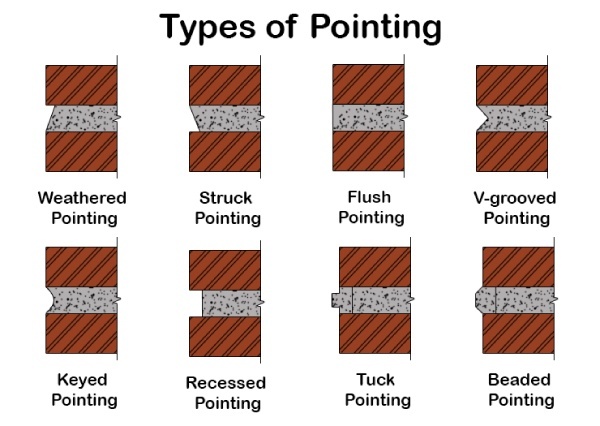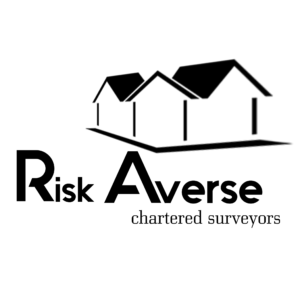Pointing is the process of installing a final finish to the wall between the bricks which can often account for between 10 and 15% of the wall surface and so has a very important role both in making the wall aesthetically pleasing and keeping it weathertight.
If the wall is inadequately pointed it can cause irreparable damage to the buildings; particularly older buildings which have softer brickwork.
There are several styles of pointing and pointing mixes which we will touch on more below.
Styles of Pointing

The most common style of pointing is flush pointing. In this instance cement pointing is simply installed flush with the surface of the wall.
Another common style of pointing is sometimes referred to as bucket handle or concave pointing in which the cement is installed much as it is in the case of flush pointing but a rounded tool is then used to give a concave finish.
Weather struck pointing where the cement is installed and then given an angle down and away from the face of the wall.
A less common style of pointing but one which is seen from time to time is recessed pointing where pointing is simply installed in the wall but set back from the surface and given a vertical finish.
Tuck pointing is a less common style of pointing where the cement is given a colouring so that it looks the same as the brickwork and then whilst still wet a bead of lime putty is installed in the wall and cut to very straight lines. In this way older uneven brickwork can be made to look as if it is very uniform and so this style of pointing is more common on older walls where brickwork of the time was of lower quality and therefore uneven.
It is important to note that when installing pointing, the old pointing must be removed fully and the mortar between brickwork ground back to at least 15 to 20 mm. In this way the new pointing which is installed will have a longer lifespan and will be less likely to fall out during the colder winter months.
When pointing older walls is not possible normally to install a sand and cement pointing mix as this will be too hard. Hard cements with old soft brickwork will cause spalling to occur.
Therefore older brick walls will normally need a softer mortar which will allow water to dry out through the pointing rather than through the brick and in this instance it is common to use what is known as a gauged mortar. In modern terms this normally comprises of sand, cement, lime and water however in some listed buildings it will be necessary to use older styles appointing which can comprise simply of lime and sands or other aggregates.
There are also different types of sand which can be used some of which are more impervious to water penetration such as sharp sand, this is often used in roofing applications.
Issues with pointing
The primary factors that cause mortar to deteriorate are exposure to adverse weather conditions, expansion and contraction due to temperature changes, erosion from water and the natural ageing process of the material. The harsher the environment and the more prolonged the exposure to the adverse or extreme conditions, the faster the mortar will deteriorate.
Superficial surface cracks are no immediate cause for concern, but cracks that indicate more widespread or severe decay, damage or deterioration of the mortar should be taken seriously.
Periodic mortar repairs represent a cost-effective alternative to more extensive repair and renovation work when damage to mortar becomes more severe.
The wrong pointing mixture can cause issues with your property, too hard or too soft and the pointing will crumble away and deteriorate quicker or cause the face of your brickwork to blow and spall.
Deteriorate mortar pointing can also cause water ingress and damp internally.
We cover pointing issues and defects within our RICS Homebuyers Level 2 and RICS Level 3 Building Surveys. We can also undertake specific defect identification reports identifying the issues, treatments and budget costs as necessary.
If you have any queries or concerns, feel free to give one of our team a call on 01706 614766 or email us at [email protected]. We are based in Rochdale but cover the North West, surrounding areas and the rest of the UK.
